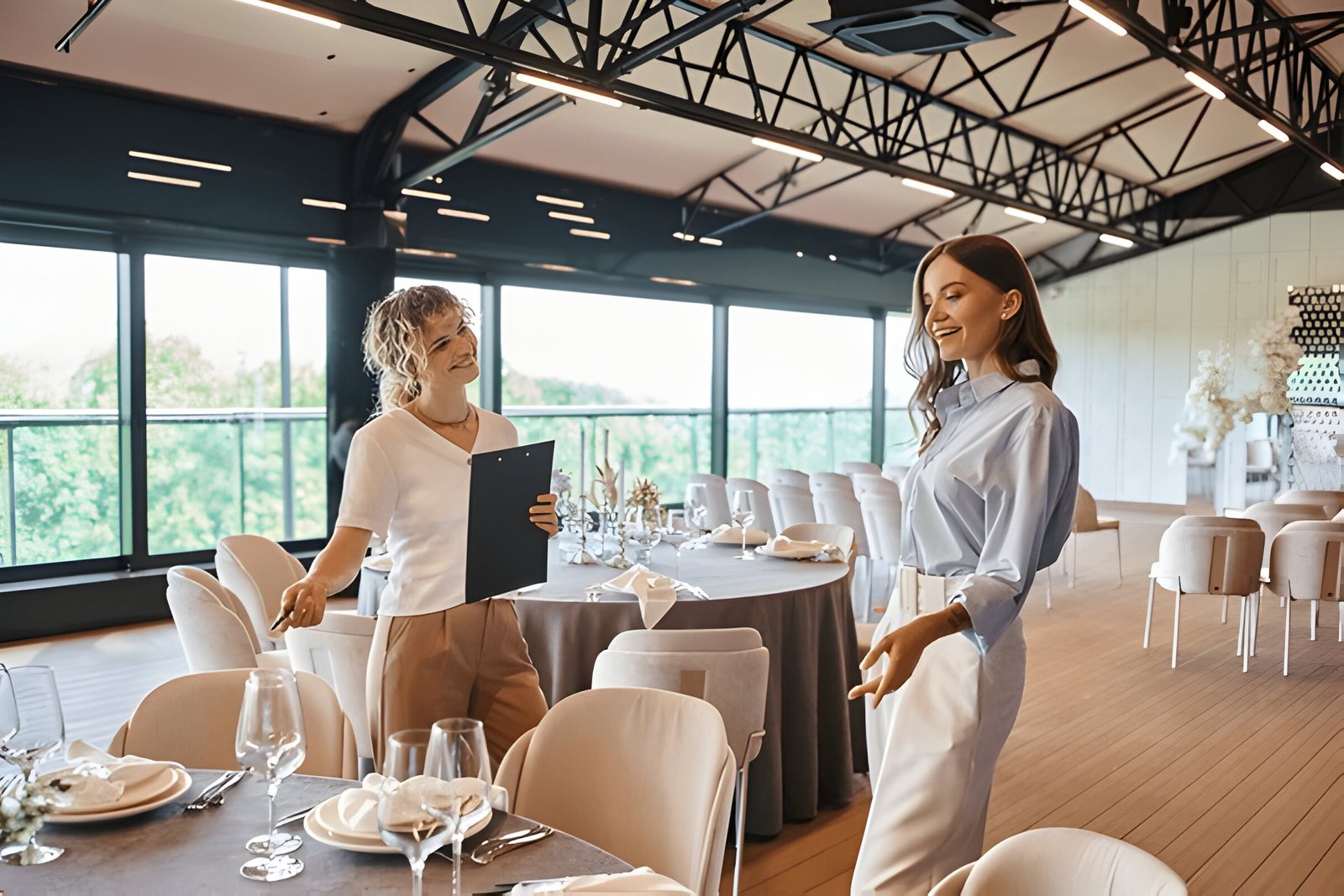Planning a wedding is a monumental task that can overwhelm even the most organized couples. This is where wedding events organizers step in, bringing their expertise to turn dreams into reality. These professionals have mastered the art of crafting unforgettable celebrations, from selecting stunning wedding venues to coordinating every detail of the big day. Their knowledge spans across various aspects, including dress code selection, crafting the perfect wedding invitation, and arranging captivating wedding decorations.
Top wedding planners understand that each couple’s vision is unique, and they work tirelessly to bring these visions to life. They offer guidance on everything from choosing the right wedding photographer to planning exotic destination weddings. Their experience in event planning allows them to navigate challenges smoothly, ensuring that every aspect of the wedding day unfolds seamlessly. In the following sections, we’ll explore key insights from leading wedding events organizers to help couples create their perfect celebration.
Selecting the Perfect Venue
Choosing the ideal wedding venue sets the tone for the entire celebration. Wedding events organizers emphasize the importance of starting the search early, typically 12 to 18 months in advance, to secure the desired location and date. This process involves considering various factors, exploring popular venue types, and conducting thorough site visits.
Factors to Consider
When selecting a wedding venue, couples should take into account several key aspects:
- Budget alignment
- Guest capacity
- Location accessibility
- Available amenities
- Venue style compatibility with wedding theme
- Flexibility for customization
- Weather contingency plans
Popular Venue Types
Wedding venues come in diverse forms, each offering a unique ambiance:
- Hotels and resorts
- Country clubs
- Barns and farms
- Vineyards
- Historical sites
- Beaches
- Religious settings
Site Visit Checklist
A comprehensive site inspection has a significant impact on the venue selection process. Wedding planners recommend preparing a checklist that includes:
- Venue capacity and layout
- Available dates
- Pricing and payment terms
- Catering and bar options
- Lighting and sound systems
- Parking facilities
- Restroom accessibility
- Setup and teardown logistics
By thoroughly evaluating these aspects, couples can make an informed decision and choose a venue that aligns perfectly with their vision for their special day.
Creating a Realistic Budget
Creating a realistic budget is crucial for a successful wedding. To start, couples should have an honest conversation about their financial resources and expectations. This discussion helps determine what they can comfortably afford and how to allocate funds effectively.
Setting Priorities
To make the most of their budget, couples should identify their top three priorities for the wedding. These could include aspects such as the venue, catering, or entertainment. By focusing on what matters most, they can allocate more resources to these areas while being more frugal in others. For example, if food is a top priority, a couple might choose to invest in high-quality catering while opting for more affordable decorations.
Hidden Costs to Watch For
Many couples are caught off guard by hidden costs that can quickly add up. Some common unexpected expenses include:
- Service charges and taxes
- Overtime fees for vendors
- Alterations for wedding attire
- Postage for invitations
- Vendor meals
To avoid surprises, couples should carefully review contracts and ask vendors about potential additional fees. It’s wise to set aside 5-15% of the total budget for unforeseen expenses.
Money-Saving Tips
There are several ways to cut costs without sacrificing the overall wedding experience:
- Choose an off-peak date or day of the week
- Limit the guest list
- Opt for a buffet or family-style meal instead of a plated dinner
- DIY some elements, such as invitations or decorations
- Consider renting attire or accessories instead of buying
By implementing these strategies and staying mindful of their priorities, couples can create a memorable wedding day without breaking the bank.
Designing a Cohesive Wedding Theme
Choosing Colors and Style
Selecting a wedding color palette is crucial for creating a cohesive theme. The chosen colors influence various aspects of the wedding, from stationery to floral arrangements and table linens. When deciding on a color scheme, couples should consider their venue’s existing features and architecture. For instance, delicate pastels complement a garden setting, while elegant whites and beiges illuminate a cozy chapel.
Seasonal colors can also enhance the wedding decor, especially for outdoor venues. Soft pinks evoke spring, cool blues refresh summer events, warm reds and oranges set an autumnal mood, and rich burgundy tones suit winter celebrations. The chosen palette should serve as a general guide for the overall feel of the wedding day, rather than strict matching of every element.
Incorporating Personal Touches
To make the wedding truly unique, couples should weave elements of their personalities, interests, and love story into the design. This approach helps create an intimate atmosphere, even in formal settings. Personal touches can range from custom monograms on invitations to creative signage featuring favorite quotes or book excerpts.
Couples can also honor their heritage by incorporating cultural traditions. For example, a Colombian bride might include the “Hora Loca” or “Crazy Hour,” featuring performers in feathers and sequins parading on stilts while guests dance with glow sticks. Another way to personalize the event is by recreating memorable cuisine shared as a couple, such as reimagining a favorite dish from an engagement celebration abroad.
Working with Vendors
Effective communication with wedding vendors is essential to bring a cohesive theme to life. When sharing ideas with florists, planners, and other professionals, it’s helpful to use inspiration boards as guidelines rather than strict rules. This approach allows vendors to combine different elements creatively, resulting in a bespoke design that aligns with the couple’s vision.
It’s important to respect vendors’ expertise and understand the limitations of certain requests. For instance, matching flower colors exactly to fabric swatches may not be feasible due to the natural variations in blooms. Instead, couples should trust their florists to suggest complementary or contrasting colors that enhance the overall look.
By treating vendors with respect, clearly communicating expectations, and being open to their professional advice, couples can ensure a smoother planning process and achieve a cohesive wedding theme that reflects their unique love story.
Conclusion
Orchestrating a wedding involves a multitude of decisions, from picking the perfect venue to designing a cohesive theme that reflects the couple’s unique story. By focusing on key aspects like creating a realistic budget, selecting appropriate colors, and incorporating personal touches, couples can bring their dream wedding to life. Working closely with experienced vendors and heeding the advice of seasoned wedding planners can make the journey from engagement to “I do” much smoother and more enjoyable.
In the end, a successful wedding celebration is about more than just the details – it’s about creating lasting memories for the couple and their loved ones. By keeping their priorities in focus and staying true to their vision, couples can craft a day that not only looks beautiful but also feels deeply personal and meaningful. With careful planning and a touch of creativity, every couple can create a wedding day that’s as unique as
their love story.
FAQs
1. What are the key qualities of an effective wedding planner?
To excel as a wedding planner, it’s crucial to be resourceful and proactive. You should seek out the best deals and unique ideas to make the event memorable. Your role involves solving problems before they become apparent and ensuring the wedding is unforgettable for the couple.
2. How can a wedding planner distinguish themselves from others?
The key to standing out as a wedding planner is mastering the art of personalization. Understand that each couple is different, and customizing your services to fit their specific needs, tastes, and backgrounds is essential. Focus on getting to know their unique vision and preferences.
3. What are the most important considerations when organizing a wedding?
When planning a wedding, the top considerations include:
- Budget: Manage finances carefully to maintain balance.
- Research: Thoroughly research options and possibilities.
- Guests: Consider the guest list and their needs.
- Location & Venue: Choose the right place that fits the wedding theme and size.
- Menu: Plan a menu that caters to the tastes of the couple and their guests.
- Playlist: Review and organize the music to ensure it fits the occasion.
- Backup Plan: Always have a contingency plan in place.
4. What is the most challenging aspect of being a wedding planner?
The most challenging part of the job is managing the high levels of stress that come with planning and executing a wedding. Meeting the high expectations of clients, regardless of the challenges that arise, is a significant part of the role.











